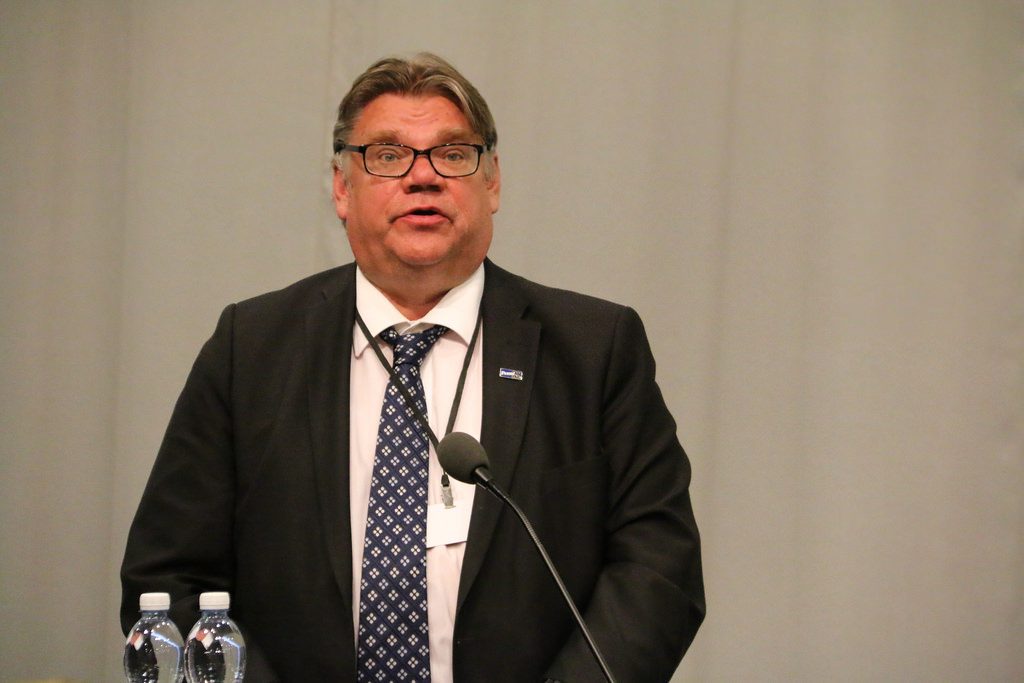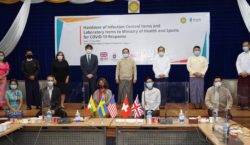
Finland’s Foreign Minister, Timo Soini, gave his view on the state of Myanmar, the bilateral relationship with Finland, government aid and much more in an interview with independent Myanmar media, Mizzima.
In the interview Timo Soini very soon made it clear that Finland supports the newly elected government with President, Htin Kyaw, and NLFD as the powerholders.
“Finland is ready to work with all democratically elected governments and that is also the situation in the other houses of parliament”, he said and indicated that Finland are ready to make stronger bonds with Myanmar:
“We want to cooperate with you, discuss with you, and also it would be very very good to create personal friendships and knowledge at a local level.
And of course the chances to increase commerce – exports and imports – is very important. And we can help, maybe in the education system, Finland is number one in many ways. [With regard to] the education system and also the freedom of press, these kind of structures are very important; but of course the initiative and the will and the passion must come from Myanmar.”
As this was said, Timo Soini made it clear, that there’s still a long way to go for Myanmar and Finland will be expectant and follow the progress.
“There are still shortages, we know that. But to get civil governments functioning, that is democracy, and we hope that it is going the right way.
And then there are NGOs. It’s very important that civil society and the people as a whole, and it’s a very feasible field to nourish cooperation, not just at an upper level, but also at an NGO level. And one of the good signs is that obviously you [Mizzima, the media] are here, so that is a kind of confidence-building, and you will know more about us and we will have the chance to discuss and ask you about the questions.”
Talking about opportunities for commerce between Finland and Myanmar, Timo Soini saw prospects but once again made clear expectations:
“Of course, you are a big country in population – a lot of consuming power and you will go upwards, so that is also business challenges for us. Clean tech is one, environmental sustainable energy solutions, of course IT. And you have a lot of workforce. And I know that, in that sense, to find the firms and the workforce – and the local knowledge, local know-how; how the markets and how the society in Myanmar works, it is then very essential to convince our businesses that it is safe, that it is not corrupted, it is functioning, it is delivering, that it is secure to invest in Myanmar. That is how the job is going to be done”.
The government aid
If Myanmar’s progress as a country are to follow what’s expected from Timo Soini and many other external governments all over the world the aid and support from more developed countries is a necessity. That includes Finland’s government aid to Myanmar. Timo Soini also elaborated on which programmes and specific issues Finland would like to be working with:
“Of course, schooling is one, and another is the empowering of women and girls. I think every nation that neglects girls is missing half of its potential. And that is why we in Finland also encourage women to deliver. And also, every man, including us, we have a mother. And mothers are very influential; that is why they are very important to confidence-building and also in the modern societies.
And of course then there is health care. It’s very important to find the structures so that you are treated because of your diagnosis and sickness – not by a wallet.
And that is very important: that you get these structures right.
And of course the responsibility is for the men or the people. But if we can help and say what has been working in Finland, this can be, in a way, exported. But it cannot come up here [indicates a high level], it must come as basic things for people.
Usually people, if you treat them well, and give them a chance, and give them schooling and give them a pen, and maybe now there is this [unclear]. So these are the essential things.
But what we don’t want to do: we don’t want to teach what your beliefs are, how do you believe; and we don’t want to get rid of your traditions. It’s your country. But if we can connect these issues then I think we can help”, he told to Mizzima.
Patient peace process
Myanmar is a turbulent country finally blooming after 49-years of Military Junta, which ended in 2011. Peace process are now underway with support from the Myanmar Peace Monitor. Timo Soini urged for patience in the peace process:
“Usually in this kind of situation the building of trust, dialogue and that confidence-building is very important, because usually when you have a conflict or a challenging situation it requires two things. First, you have the will to really agree, and then all the participants must feel that ending the conflict, and the building of confidence, is better than carrying on in the way that exists at the moment. And these are kind of the precautions that are matters of utmost importance to get into.
And that requires good nerves, in order to keep on knocking when there are going to be setbacks, when there are going to be disappointments. And it’s good to know that it cannot turn overnight.
I’m also a passionate man. In my youth I was radical; I really wanted things to happen quickly. And sometimes I am a bit frustrated that it didn’t come as quickly as I wanted. But when you keep on going, then it gradually is happening, and that is what I call patience.
But that doesn’t mean you are giving up your principles, your aspirations, and ideas and dreams. You must just work for them. It’s not easy, but that is why it is a kind of process – a democratic and peaceful process – because in a process there are different stages, and we must always be very concentrated that we are not going downhill,” he said to Mizzima editor-in-chief, Soe Myint, who did the interview. The interview was posted in Mizzima on the fifth of May 2016.




